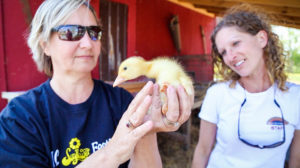Success of Women in Agritourism: She Will Get What She Wants-Factsheet Published
go.ncsu.edu/readext?546604
en Español / em Português
El inglés es el idioma de control de esta página. En la medida en que haya algún conflicto entre la traducción al inglés y la traducción, el inglés prevalece.
Al hacer clic en el enlace de traducción se activa un servicio de traducción gratuito para convertir la página al español. Al igual que con cualquier traducción por Internet, la conversión no es sensible al contexto y puede que no traduzca el texto en su significado original. NC State Extension no garantiza la exactitud del texto traducido. Por favor, tenga en cuenta que algunas aplicaciones y/o servicios pueden no funcionar como se espera cuando se traducen.
Português
Inglês é o idioma de controle desta página. Na medida que haja algum conflito entre o texto original em Inglês e a tradução, o Inglês prevalece.
Ao clicar no link de tradução, um serviço gratuito de tradução será ativado para converter a página para o Português. Como em qualquer tradução pela internet, a conversão não é sensivel ao contexto e pode não ocorrer a tradução para o significado orginal. O serviço de Extensão da Carolina do Norte (NC State Extension) não garante a exatidão do texto traduzido. Por favor, observe que algumas funções ou serviços podem não funcionar como esperado após a tradução.
English
English is the controlling language of this page. To the extent there is any conflict between the English text and the translation, English controls.
Clicking on the translation link activates a free translation service to convert the page to Spanish. As with any Internet translation, the conversion is not context-sensitive and may not translate the text to its original meaning. NC State Extension does not guarantee the accuracy of the translated text. Please note that some applications and/or services may not function as expected when translated.
Collapse ▲
Photo courtesy of Meredith C. Browne–See It All Media.
When we hear “farmer” what comes to mind? Many may say overalls, heavy equipment, and a man behind it all. Despite the prominence of women in agriculture, and increasingly in agritourism, women rarely receive the recognition deserved of their pivotal role in this enterprise. Curious to dig further in this lack of recognition, Dr. Carla Barbieri and her team started a study in 2015 to identify barriers, visions of success, and opportunities among NC female farmers in agritourism. Early findings revealed women facing structural constraints, such as a lack of reliable staff. It also unveiled societal obstacles and biases that hinder their agritourism success.
The project has since evolved: the team just released the Success of Women in Agritourism factsheet summarizing key results from a survey of 180 women in agriculture across North Carolina. Addressing women’s roles as farmers, entrepreneurs, and stewards of their community, the survey provided a holistic understanding of women’s success in agritourism. Bringing visitors to the farm (agritourism) not only increases farmers’ income, but educates the public about farming. As most agritourism is led and innovated by women, maximizing their success is critical to enhance their identity in agriculture and enhancing society as a whole.
From the findings, the study suggests numerous approaches to improve the chances of women success in agritourism. The researchers’ work has demonstrated profound outreach impact already, emphasizing an active and growing network of female farmers regionally. They have also produced a video series documenting successful female farmers in agritourism.
Barbieri’s team continues working to publish their results and expand their outreach efforts. While the researchers work tirelessly to advance this knowledge, they prompt society to contribute to improving women’s identity in agriculture and foster opportunities for their success in agritourism. Whether it is acknowledging our own biases, or encouraging women farmers to network and support each other, a successful and equitable future in agritourism is attainable.


